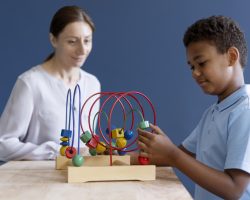Tag Archives: ASD
Masking To Fit in a Neurotypical World

Neurotypical vs. Neurodivergent
Neurodiversity and inclusive communication techniques:“Neurotypical” describes an individual with typical neurological development, while “neurodivergent” refers to people with brain-based conditions such as Attention Deficit Hyperactivity Disorder (ADHD), Nonverbal Learning Disorder (NVLD), Autism Spectrum Disorder (ASD), learning disabilities, and mental health conditions. These challenges can make it difficult for neurodivergent individuals to understand what neurotypicals are communicating.
Challenges of Neurodivergent Communication
Many neurotypicals have little understanding or experience interacting with neurodivergent individuals. As a result, they often interpret neurodivergent communication styles as rudeness or character flaws. Some of these behaviors include:
- Poor eye contact
- Interrupting
- Inappropriate laughter
- Speaking too loudly
- Literal interpretation of words
- Repetitive questions
- Invasion of personal space
- Blunt comments
- Tactless jokes
- Rigid thoughts or behaviors
These behaviors are often blamed on poor parenting, with assumptions that parents failed to teach manners or discipline their children.
The Invisible Struggles of Neurodivergent Individuals
If you are neurotypical, you’ve likely encountered frustration when communicating with a neurodivergent person without realizing it. Since there are no visible signs of neurodivergence, you might not have understood their behaviors and communication challenges. Neurodiversity and inclusive communication techniques Had you known, you might have approached the interaction with more patience and understanding.
In an ideal world, both neurotypical and neurodivergent individuals would coexist in a way that respects and accommodates their differences. However, society often expects neurodivergent people to conform to neurotypical norms. This leads to a practice called “masking.”
The Consequences of Masking
Masking is a coping strategy used by neurodivergent individuals to appear neurotypical in social situations, avoiding rejection or bullying. It may involve imitating neurotypical behaviors, suppressing stimming (repetitive movements or sounds), or hiding sensory sensitivities.
While masking can help in certain situations, it is mentally exhausting for neurodivergent individuals who may not fully understand the social behaviors they are imitating. This often leads to increased feelings of loneliness, anxiety, and depression.
Celebrating Neurodiversity
Neurodivergent individuals struggle in environments designed for neurotypicals, but neurodiversity is not something that needs to be “fixed.” It’s about accepting and respecting the natural variation in brain functioning, celebrating strengths, and making room for accommodations.
Strategies for Better Communication
To communicate effectively between neurotypical and neurodivergent individuals, both parties need to be willing to make adjustments. Here are some strategies for bridging the communication gap:
- Use straightforward language: Avoid metaphors, idioms, and sarcasm. Be mindful that not everyone understands nonverbal cues like body language or tone.
- Be patient: Give more time for processing information when needed.
- Acknowledge different communication styles: Listening, taking notes, moving while talking, or using visual aids are ways people understand information differently.
- Avoid sensory overload: Bright lights, loud noises, or strong smells can overwhelm neurodivergent individuals, so try to communicate in calm, quiet environments.
- Be respectful and open-minded: Don’t make assumptions or judgments about someone’s communication style.
- Check for understanding: Periodically ask for clarification to ensure both parties are on the same page.
- Seek feedback: Ask how you can improve communication to better accommodate the other person.
Creating an Inclusive Society
Greater awareness and understanding of neurodivergence are essential for creating a more harmonious and inclusive society. Events like Neurodiversity Celebration Week (March 13-19, 2023) are a great starting point for raising awareness. Founded by Siena Castellon, an autistic teenager with ADHD, dyslexia, and dyspraxia, Neurodiversity Celebration Week aims to change the narrative around neurodiversity by highlighting strengths as well as challenges.
About Linda Karanzalis
Linda Karanzalis, a Board-Certified Cognitive Specialist and the author of Misnamed, Misdiagnosed, Misunderstood, has been an advocate for neurodivergent individuals for over 25 years. As someone with NVLD and ADHD, Linda understands the struggles firsthand. She has dedicated her life to helping individuals with NVLD, ADHD, learning disabilities, and those on the autism spectrum.
Dr. Ned Hallowell, a psychiatrist and world-renowned ADHD expert, praises Linda’s work, saying: “Linda’s book is vivid, compelling, full of heart and fresh understanding. Karanzalis replaces suffering with clarity and triumph for the millions of people with NVLD.”
Learn more about Linda’s work and her book at www.lindakaranzalis.com.
Follow Linda Karanzalis through her social media accounts:

Join the NVLD and NeuroDivergent Facebook Support Group
 Linda Karanzalis, MS
Linda Karanzalis, MS
Linda Karanzalis, MS, is a former special education classroom teacher with over 25 years of experience in the areas of learning disabilities, ADHD, social-emotional learning, social skills training, and behavior management














